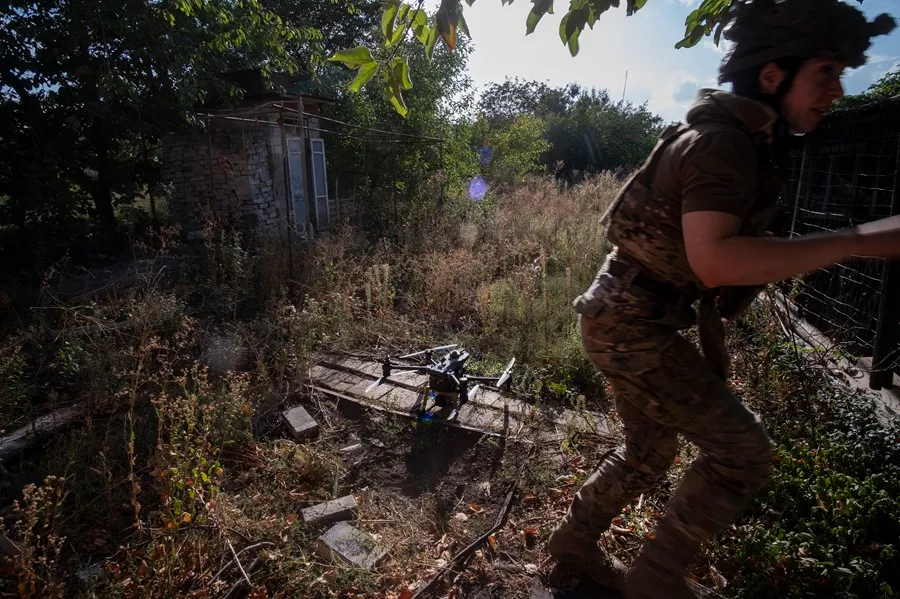International
Ukraine and Russia exchange more prisoners while attacking and counterattacking in Kursk

Ukrainian troops continue to press and even advance in some areas of the Russian region of Kursk, despite the recent counteroffensive initiated by Russia, which carried out this Saturday with Ukraine the third exchange of prisoners of war since the Kiev incursion into Russian territory.
According to the Ukrainian analytical project DeepState, in the Kursk region the Kiev forces occupied Vetreno, Durovka and part of Zhuravli, while the Russians recovered Snagost with the surrounding peoples and advanced towards Liubimivka.
The Russian Army launched a counteroffensive this week in Kursk, where Ukrainian troops entered on August 6 to try to ward off Russian attacks against the northeastern regions of Kharkiv and Sumi and slow down Russian pressure on the eastern front of Donetsk, and came to occupy 1,300 square kilometers of territory.
Russia claims to have regained control of ten localities and, although Ukrainian President Volodymyr Zelensky admitted this week that a Russian counteroffensive is underway, both the Pentagon and the US Institute for the Study of War (ISW) consider the operation “marginal” today.
Zelenski also assures that Russia has not obtained “important achievements” in the counterattack, for which Russia plans – as he said – to increase the number of soldiers deployed in Kursk to between 60,000 and 70,000.
Russia deploys more soldiers in Kursk
At the beginning of the Ukrainian incursion, the Russians kept about 11,000 soldiers in this area, while now, according to various estimates, there are 30,000 to 45,000, said Vadim Misnik, spokesman for the tactical-operational group “Síversk” on Ukrainian television.
“The enemy is trying to increase forces to stop our offensive,” he said.
Moscow said in the meantime this Saturday that the Russian Army rejected in the last 24 hours up to five attempts by Ukrainian troops to cross the border, especially near the small town of Veseloye.
However, the Ukrainian drone unit Jorne, assured the day before that Kiev’s troops had penetrated the Russian border in a new place and advanced “kilometers within Russia.” As alleged evidence, he published a video on Telegram that would show Ukrainian forces allegedly advancing towards Veseloye.
However, Russia and Ukraine carried out this Saturday the third exchange of prisoners of war since the incursion of Ukrainian troops in Kursk.
More than 300 soldiers exchanged since the incursion
The day before, the Ukrainian president reported an exchange that resulted in 49 prisoners released from Russian captivity – among which 23 women were for the first time in a long time – and today each side recovered 103 soldiers with the humanitarian mediation of the United Arab Emirates.
Among the Russian fighters released this weekend are Russian soldiers that Ukraine captured in Kursk, as well as at the end of August, when the two parties exchanged 230 prisoners of forerra.
Zelenski celebrated on his Telegram channel the return of 82 plains and non-commissioned officers and 21 officers, including 31 defenders of the Azovstal steel mill in Mariupol, in the eastern region of Donetsk.
On this front, Zelensky’s plan to force Russian President Vladimir Putin to deploy more troops in Kursk by removing soldiers assigned to the Donetsk sector is only partially successful, since Russia continues to advance on this front, although only marginally.
According to DeepState, in the last few hours it has done so in Pishchane, Niu-York, Ukrainsk, Sinkivka and three other towns in Donetsk.
The ISW in turn points out that geolocated images of Thursday and Friday also show the Kremlin troops advancing gradually in the east of Toretsk and southeast of Pokrovsk, as well as southeast of Khasiv Yar, and that it continues its offensive west of the city of Donetsk.
They have also further consolidated control over Klishchiivka, according to the same source.
The General Staff of Ukraine indicated in its afternoon war part that another hot spot is the Kurajove sector, where the Russians attacked Ukrainian units on 27 occasions today.
International
Dominican ‘False Hero’ Arrested for Faking Role in Nightclub Collapse That Killed 231

A man identified as Rafael Rosario Mota falsely claimed to have rescued 12 people from the collapse of the Jet Set nightclub in Santo Domingo—a tragedy that left 231 people dead—but he was never at the scene.
Intelligence agents in the Dominican Republic arrested the 32-year-old man for pretending to be a hero who saved lives during the catastrophic incident, authorities announced.
Rosario Mota had been charging for media interviews in which he falsely claimed to have pulled survivors from the rubble after the nightclub’s roof collapsed in the early hours of April 8, during a concert by merengue singer Rubby Pérez, who was among those killed.
“He was never at the scene of the tragedy,” the police stated. The arrest took place just after he finished another interview on a digital platform, where he repeated his fabricated story in exchange for money as part of a “media tour” filled with manipulated information and invented testimonies.
“False hero!” read a message shared on the police force’s Instagram account alongside a short video of the suspect, in which he apologized: “I did it because I was paid. I ask forgiveness from the public and the authorities.”
Central America
Nicaraguan Exiles to Mark 7th Anniversary of 2018 Protests with Global Commemorations

The Nicaraguan opposition in exile announced on Thursday that it will commemorate the seventh anniversary of the April 2018 protests against the government of President Daniel Ortega and his wife, Rosario Murillo, with events in Costa Rica, the United States, and several European countries.
The commemorative activities—which will call for justice for the victims, as well as freedom and democracy for Nicaragua—will include religious services, public forums, cultural fairs, and other public gatherings, according to official announcements.
In April 2018, thousands of Nicaraguans took to the streets to protest controversial reforms to the social security system. The government’s violent response quickly turned the demonstrations into a broader call for the resignation of President Ortega, who is now 79 and has been in power since 2007.
The protests resulted in at least 355 deaths, according to the Inter-American Commission on Human Rights (IACHR), although Nicaraguan organizations claim the toll is as high as 684. Ortega has acknowledged “more than 300” deaths and maintains the unrest was an attempted coup d’état.
International
Arsenal stun Real Madrid at the Bernabéu to reach Champions League semifinals

Arsenal enjoyed a “historic night” on Wednesday after defeating Real Madrid 2-1 at the Santiago Bernabéu, knocking them out of the Champions League quarterfinals, midfielder Declan Rice said.
“It’s such a special night for this club, a historic night for this club,” said Rice, who scored twice in the first leg in London, speaking to TNT Sports.
The English international was named Man of the Match in both legs — the 3-0 win in London and the second leg in Madrid.
“It’s amazing. I knew we were on an upward trajectory and we’ve done incredibly well in this competition. We deserve it and we have full confidence in our coach. Reaching the semifinals is unbelievable,” Rice added.
-

 International4 days ago
International4 days agoNightclub Collapse in Dominican Republic Claims 226 Lives
-

 International4 days ago
International4 days agoVenezuela accuses Guyana of “warlike intentions” after UK defense deal
-

 Central America3 days ago
Central America3 days agoHonduran Police Offer $135K for Tips Leading to the Arrest of Romeo Vásquez
-

 Central America2 days ago
Central America2 days agoPetro questions Ecuador’s vote, cites reports of military control and arrests
-

 International3 days ago
International3 days agoMPV Denounces Electoral Blockade as Secretary-General is Disqualified for May Elections
-

 International3 days ago
International3 days agoMaduro Plans Major Workers’ March on May 1st to Defend Venezuela’s Freedom
-

 International1 day ago
International1 day agoArsenal stun Real Madrid at the Bernabéu to reach Champions League semifinals
-

 International1 day ago
International1 day agoBogotá residents line up for yellow fever vaccine amid national alert
-

 International1 day ago
International1 day agoMexico refuses to restore ties with Ecuador while Noboa remains in office
-

 International2 days ago
International2 days agoColombia: Search continues for missing limb of italian scientist found dismembered
-

 International1 day ago
International1 day agoDeSantis’ immigration crackdown sparks alarm in Venezuelan Communities in Doral
-

 International2 hours ago
International2 hours agoDominican ‘False Hero’ Arrested for Faking Role in Nightclub Collapse That Killed 231
-

 Central America2 hours ago
Central America2 hours agoNicaraguan Exiles to Mark 7th Anniversary of 2018 Protests with Global Commemorations















